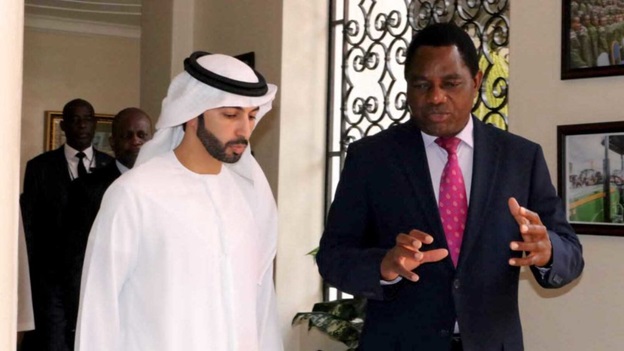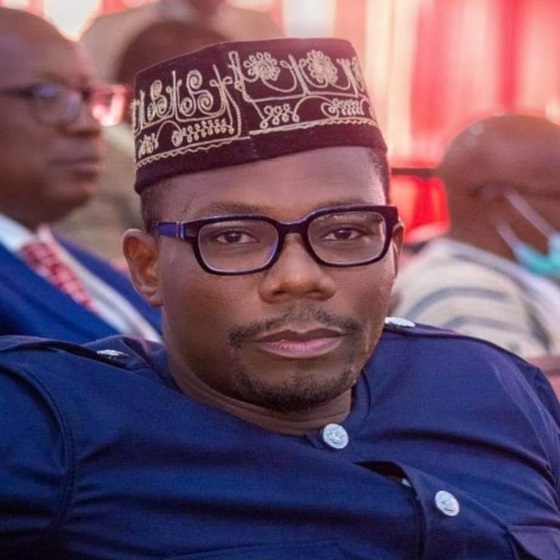A company established by a Dubai sheikh is finalizing agreements with African nations to manage vast tracts of their forests and sell the carbon credits. Critics are concerned the deals will not benefit Africans and will just help foreign governments perpetuate high emissions.
A prominent sheikh in the oil-rich Gulf state hosting this year’s UN climate negotiations, COP28, is heading a new rush to capture and sell carbon credits by managing tens of millions of acres of forests across Africa. Sheikh Ahmed Dalmook Al Maktoum, a member of the royal family of Dubai, which is part of the United Arab Emirates (UAE), wants to sell those credits to rich governments in the Gulf and elsewhere, so they can offset their carbon emissions to help them meet their carbon pledges under the 2015 Paris Agreement.
The deals on offer could in theory be a boon to forest conservation across Africa. But the rules for the trades that the Sheikh Ahmed envisages have yet to be set. And there is growing concern that the potential carbon gains may prove bogus, undermining the Paris Agreement.
“There is a scramble for Africa’s forest carbon,” says Saskia Ozinga, co-founder of Fern, a European environmental justice NGO. “But these deals risk defrauding the countries, the forest communities, and the climate, and appear to be negotiated by African governments who don’t understand carbon markets or are personally benefitting from the deals.”
The forests and farm woodlands of Africa are increasingly being recognized as an important store of planetary carbon. They currently capture more atmospheric carbon dioxide than the Amazon rainforest. Their protection is vital to curbing climate change. But they are mostly in very poor countries.
Sheikh Ahmed’s company has initiated deals with governments in Liberia, Tanzania, Zambia, and Zimbabwe.
So, their governments have long seen selling carbon credits derived from protecting forests as a way to fund their conservation. Their Africa Carbon Markets Initiative launched at last year’s COP27 in Egypt envisaged that by 2050 carbon trading could unlock more than $100 billion in investment for credits, much of it from forests.
To date however, few African countries have developed forest management projects with demonstrable carbon gains for sale. So, there is excitement in many capitals about a new wave of proposals from foreign carbon entrepreneurs that could fast-track finding revenues for conservation.
The most active of these new companies is Blue Carbon, set up last fall by Sheikh Ahmed, whose other business activities include power plants and trading in the Gulf’s oil and liquefied natural gas. After the launch, he promised: “The core of our work is to enter into bilateral agreements with governments and private entities across the globe so that, together, we can boost investments in [nature-based] carbon projects.”
To that end, his company has since signed memorandums of understanding (MOUs) with governments in Liberia, Tanzania, Zambia, and this month Zimbabwe, to manage some 60 million acres of their forests, an area the size of the United Kingdom, and sell the carbon credits that the management generates. A recent resolution of the Liberian Cabinet supporting the deal said it would allow the country to “leverage the carbon potential of its vast forest resources … to generate revenue.”
The MOUs will form the basis of formal contractual agreements, which Sheikh Ahmed has suggested could be unveiled at COP28 in Dubai in December. The same meeting is set to agree on the rules for his intended market — government purchases of carbon credits that can offset emissions as part of national pledges, known as Nationally Determined Contributions, submitted under the Paris Agreement.
The concerns of critics are threefold. First, that forest communities will lose control of their forests. Second, that little revenue from carbon-credit sales will reach either African governments or forest communities. And third, that the credits may often undermine action on climate change, by providing bogus carbon offsets — for instance by claiming to protect forests not at risk of being cut down — that would allow foreign governments purchasing the credits to carry on with high emissions.
Those concerns are all the greater because the new ranks of would-be carbon traders are often unknown quantities. Bue Carbon is a privately-owned company with no track record of either forest management or carbon trading.
The final contract with Liberia, which insiders say may be signed imminently, is “an extraordinary giveaway of power to Blue Carbon in return for airy-fairy royalty promises,” says Jutta Kill, a German analyst of carbon markets. Blue Carbon contests this. It describes its aim as “to create environmental assets, nature-based solutions and register carbon-removal projects [to] accelerate the UAE’s initiative in curbing carbon emissions.”
Blue Carbon wants to sell credits to governments, so they can count them toward their national emissions pledges.
The four MOUs that Blue Carbon has so far signed in Africa cover a fifth of Zimbabwe (18 million acres), roughly a tenth of Liberia and Zambia (2.5 million acres and 20 million acres respectively), and 8 percent of Tanzania (a further 20 million acres). The company has also approached another well-forested African country, Angola.
It has made bold promises. At a workshop in Angola last October, Sheikh Ahmed offered to conduct a national forest inventory and said that the country had “great potential … because of its huge forests, which are natural carbon sink sites.”
In Liberia, Blue Carbon promises that it “will be responsible for the development of feasibility studies, securing respective accreditation of the cooperation framework [while] identifying forest areas and regions that can be utilized to earn carbon credits.”
The Zimbabwe MOU promises to use revenues to fund community welfare programs. “Our carbon projects will not only make a positive impact on the environment, but also lead to meaningful improvements in the lives of the people who need it most,” says Blue Carbon CEO Josiane Sadaka, a British-educated brand manager for several companies owned by Sheikh Ahmed.
But so far, the company has offered no detail about how it plans to increase or protect threatened carbon stocks in the vast tracts of forests it wants to control.
In this policy vacuum, public debate about the proposals has been minimal, except in Liberia, a West African country originally created as a home for freed American slaves. Despite recent losses to illegal logging, it remains substantially forested and contains almost half the remaining Upper Guinea Forest, which once occupied most of coastal tropical West Africa. Those forests are known for their endangered species, including West Africa’s largest herd of forest elephants, indigenous Liberian mongooses, Diana monkeys, and the world’s only viable population of pygmy hippos.
But the forests are also an important economic resource for many communities. The failure to consult them meaningfully has created s fierce backlash. Liberia’s vibrant NGO community and vocal media have questioned both the legality of the deal and how much the country’s government, forests, and communities will gain from handing over a tenth of the country to a foreign entity.
A draft final agreement with Liberia, which Yale Environment 360 has seen, says that Blue Carbon alone will have the right to sell carbon credits from the forests included in the 30-year deal. Liberia will not be able to use them to meet any climate pledges of its own. Besides taking various transaction costs, Blue Carbon will initially take 70 percent of the sale price of carbon credits, with 30 percent left for Liberia.
“Without any doubt, this is a very bad deal for Liberia and communities,” says a critic.
Many see this is a bad deal. But whatever the financial arrangements, “the deal is illegal in several ways” says Silas Siakor, founder of the Sustainable Development Institute (SDI), a Liberian environmental justice NGO affiliated with Friends of the Earth International. In particular, he says, it violates existing land-rights laws that formalize forest communities’ rights to give or withhold consent for any concessions granted by the government on their land.
“Without any doubt, this is a very bad deal for Liberia and communities,” says Jonathan Yiah, SDI’s forest governance coordinator. The controversy is becoming an issue in the country’s general election, scheduled for October.
International voices are being raised too. A group of 16 international forest NGOs called in July for a halt to the Liberia deal, citing its illegality. Earlier this month, USAID, Conservation International, the World Bank, and other foreign agencies with conservation and community projects in Liberian forests, met finance minister Samuel Tweah, who signed the Blue Carbon MOU, to air concerns about how the deal will impact their work and the communities they support.
The Liberian government has declined a request for comment, but one of those who attended the meeting said: “At the moment, the government is still trying desperately to ensure the deal with UAE’s Blue Carbon is signed sooner than later.”
In the scramble for African carbon credits, Blue Carbon has rivals. Some are local actors keen to find new ways of making money from forests. But others are international players.
In Tanzania, there is GreenCop Development, a Singapore-based company incorporated in April this year, with a Belgian lawyer as its CEO. Just a month after its formation, GreenCop Development signed a deal with the Tanzanian Wildlife Management Authority (TAWA). Under the preliminary agreement, it promised to “protect the natural vegetation” of 5.9 million acres of the authority’s world-famous forests, parks, and game reserves, in return for rights to sell carbon credits accrued from them.
But how? The TAWA web site quotes its conservation commissioner Mabula Nyanda, who signed the deal, assuring Tanzanians “that the investment has no environmental impact on the forests managed by TAWA, rather it is to generate profit.”
All this has left forest defenders bemused about how the new carbon traders plan to generate the carbon credits they want to sell. Blue Carbon, at least, is much clearer about its preferred customers. But that too is ramping up concerns.
Most carbon credits for sale today go into the busy “voluntary” carbon market, which allows polluting companies to make claims about offsetting their carbon emissions. But Sheikh Ahmed has made clear that his primary focus is more ambitious. He wants to sell credits to governments, so that they can count them towards their national emissions pledges.
Despite skepticism, there will be a lobby at COP28 in Dubai for including credits from avoided deforestation in new rules.
In UN climate jargon, these credits are known as Internationally Transferred Mitigation Outcomes. After long debate, the rules for these trades, under Article Six of the Paris Agreement, are set to be decided at COP28 in Dubai in December. But as of now, it remains unclear how many of the credits to be generated in Africa by Blue Carbon, GreenCop Development, and others might qualify for sale in this market. So, much hangs on the upcoming negotiations.
In the absence of published plans for tree planting, analysts say Blue Carbon’s primary target for carbon-credit generation appears to be curbs on deforestation. This would allow it to claim carbon credits equivalent to the emissions prevented.
Credits from such “avoided emissions” are widely traded in the voluntary carbon market. But the estimates of how much carbon has been kept in the forests depend on assumptions about how much deforestation would otherwise have occurred, which are inherently uncertain. Recent studies have concluded that these counterfactual baselines often over-estimate likely deforestation in order to boost claimed credits.
This is a serious problem. But while it is clearly bad for companies to “greenwash” their reputations by relying on dubious offset claims, it is very much worse if such claims are made by governments as part of their climate pledges to the UN. They could make declarations about Nationally Determined Contributions, the mainstay of Paris pledges, meaningless.
That is why there is strong resistance by the European Union and others to the idea of making emissions from forest conservation eligible for government carbon trading of Internationally Transferred Mitigation Outcomes. “Most countries firmly oppose this, for good reason,” argues Jonathan Crook of Carbon Market Watch, a not-for-profit research organization. He says they could be used to reach national climate targets “even if such credits were environmentally worthless.”
Final decisions on the Paris Agreement’s Article Six rules will be critical to the viability of the deals being proposed by Blue Carbon in Africa, say analysts. If avoided emissions from forests are excluded, this would “drastically reduce the volume and value of credits to be sold under the [Blue Carbon] project,” according to the recent declaration of international NGOs critical of the proposed Liberia deal.
Despite the skepticism about their climatic value, there is likely to be a vocal lobby at COP28 in Dubai to have credits from avoided deforestation included — from African governments keen to monetize their forest carbon, and from the UAE hosts and others keen to buy.
Whatever decisions are made, it seems that the future of Africa’s forests, the commercial value of the carbon they contain, and how that carbon may be used to help fight climate change could be decided in the desert emirate of Dubai in the coming months. Source: YaleEviroment360








